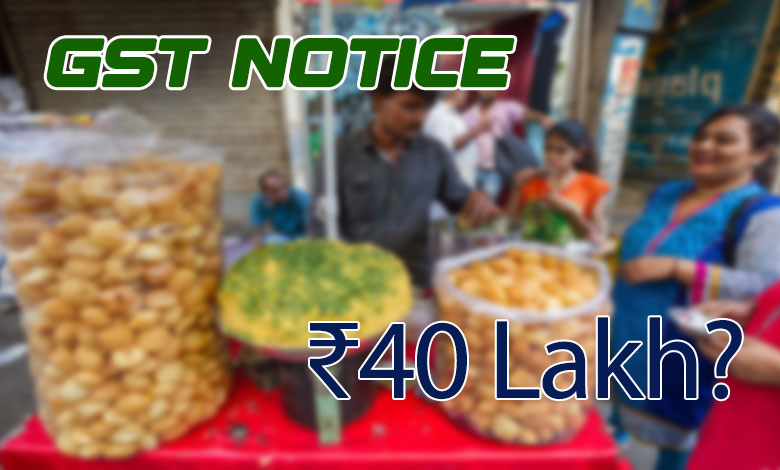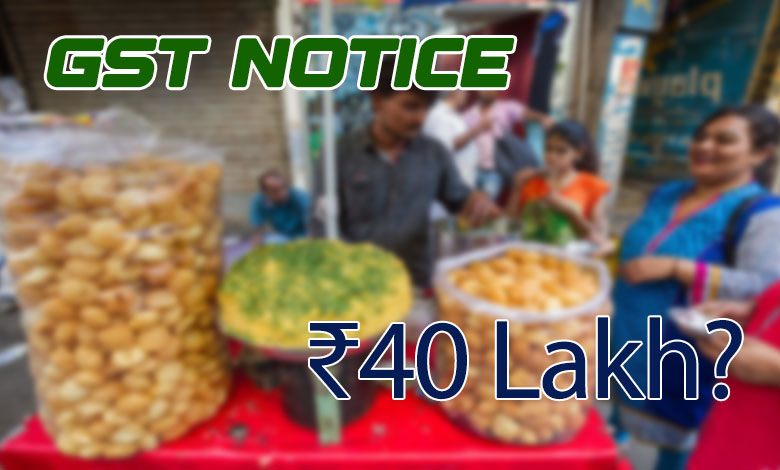Pani Puri Vendor Receives GST Notice for Over ₹40 Lakh Online Transactions: Social Media Sparks Debate

A pani puri vendor in Tamil Nadu receives a GST notice for over ₹40 lakh in online transactions, sparking a debate on social media about tax obligations for small businesses and digital payments.
Hyderabad: A Tamil Nadu pani puri vendor is making headlines after receiving a GST notice for earning over ₹40 lakh in online payments in a year. This notice, issued under the Tamil Nadu Goods and Services Tax Act and Section 70 of the Central GST Act, has ignited a widespread debate on social media about the tax obligations of small vendors in the age of digital transactions.
Table of Contents
The December 17, 2024, notice raised questions about whether small businesses, especially street vendors, should be subjected to GST after their online payments exceeded a threshold of ₹40 lakh. The notice cites transactions conducted through digital platforms such as PhonePe and Razorpay, where the vendor received payments via UPI for his pani puri services.
GST Scrutiny of Small Vendors in the Digital Age

This unexpected scrutiny shines a spotlight on the booming informal economy in India, where digital payment platforms have made it easier for small businesses to generate significant income. As more people prefer paying digitally, it has become increasingly difficult for companies, particularly street vendors, to evade the tax net.
The GST notice issued to the vendor raises a significant issue – whether vendors unaware of tax rules should be penalized for their increased digital transactions. While there is no denying that businesses must follow taxation laws, the question remains: should small-scale vendors with slim profit margins be subjected to the same rules as larger corporations?
Many social media users are divided on the issue. Some argue that the tax system needs to account for small vendors and their earnings, while others question whether it targets the wrong people. Humorous comments, such as renouncing IT jobs to open a pani puri stall, reflect the growing concerns over taxation on small businesses in the digital economy.
Also Read: Telangana School Sankranthi Holidays: Students to Enjoy an Extended 7-day Break from This Date
The Rising Trend of Digital Payments Among Small Vendors
The incident has drawn attention to the rising trend of digital payments in small businesses, which has increased speed during the pandemic. Small vendors are increasingly turning to platforms like PhonePe and Razorpay for cashless transactions, which has led to a shift in the business landscape. However, this also risks increased scrutiny by tax authorities, significantly when transactions exceed certain limits.
In the case of this pani puri vendor, the GST notice mentions that businesses are required to register under the GST Act if their earnings cross a certain threshold. This requirement has raised concerns among vendors who are unaware that their business could be subject to such scrutiny.
Some experts argue that the increasing shift to digital payments could be an attempt to streamline tax collections but is potentially hurting small business owners. There are also fears that such notices could discourage vendors from accepting digital payments, reverting to cash transactions to avoid taxation.
Social Media Reactions and Concerns Over Tax Evasion
Varying opinions on tax evasion further fuel the debate surrounding the vendor’s GST notice. Many online discussions have highlighted the contrast between small vendors’ digital earnings and salaried employees with a higher tax burden. Some social media users have expressed frustration that while street vendors are now coming under the tax net, large corporations may continue to evade taxes with limited scrutiny.
A fascinating comment on X, a popular social media platform, pointed out that the panipuri vendor’s income seemed substantial when considering the vendor’s expenses, such as ingredients and worker wages. Dr. Dheeraj K, a psychiatry professor, observed, “This is more than the salary of a professor in a medical college.”
While some argue that it is essential for all businesses to register for GST and pay taxes, others question whether this will discourage vendors from embracing digital payments, reverting to cash transactions instead.

The Larger Implication: Digital Transformation and Taxation Challenges
This incident highlights the complexities of taxation in the digital economy, where small vendors are now part of a much larger financial ecosystem. The introduction of GST and the subsequent scrutiny of digital transactions illustrate how India’s tax system must evolve in response to new payment methods and growing digital transactions.
As digital transactions grow, the government faces the challenge of creating a fair and comprehensive tax structure that accommodates small vendors while ensuring compliance. The rise in online payments has undoubtedly altered the way small businesses operate. Still, it also brings issues regarding taxation thresholds and how small-scale vendors should be classified.
While the authenticity of the GST notice remains uncertain, it has opened up a meaningful conversation on the taxation of small businesses and the rapid rise of digital payments. This debate calls for updated, more explicit taxation policies that accommodate the changing business landscape in India. Whether this incident is a one-off case or a more extensive reflection of the informal economy’s growth, it is a reminder of how digital transactions are transforming business models, especially for small vendors.
This story continues evolving as the public, businesses, and policymakers grapple with the implications of digital payments, GST, and slight vendor inclusion in the formal economy.

